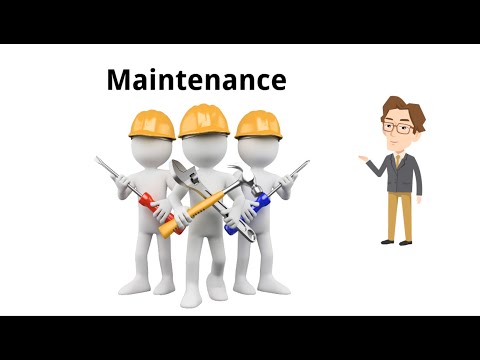Exploring Maintenance Engineering: Roles & Salaries
Maintenance Engineering Job Description: A maintenance engineer is responsible for ensuring that machinery and equipment in a facility are operating efficiently and effectively. They conduct routine inspections, diagnose technical issues, and perform repairs and maintenance tasks to prevent breakdowns and minimize downtime. Maintenance engineers also develop and implement maintenance schedules, monitor equipment performance, and recommend improvements or upgrades to optimize productivity. They may collaborate with other departments to coordinate maintenance activities, train and supervise technicians, and ensure compliance with safety regulations. A strong knowledge of electrical and mechanical systems, troubleshooting skills, and familiarity with computerized maintenance management systems (CMMS) are essential for this role.
Maintenance Engineering Salary: The salary of a maintenance engineer can vary depending on factors such as experience, location, and industry. According to PayScale, the average annual salary for a maintenance engineer in the United States is around $70,000. However, salaries can range from $50,000 to over $100,000 depending on the level of expertise and the size of the organization. Industries such as manufacturing, energy, and transportation tend to offer higher salaries for maintenance engineers due to the critical nature of their roles. Additionally, certifications and specialized skills in areas such as robotics, automation, or predictive maintenance can also contribute to higher earning potential. It is important to note that salary ranges can vary significantly in different countries and regions.

Maintenance Engineering Job Description Template
Maintenance Engineering is a crucial field that focuses on the upkeep and improvement of various systems and equipment within an organization. It involves the planning, implementation, and supervision of maintenance activities to ensure the smooth functioning of machinery, infrastructure, and other assets.
Efficiency is one of the key aspects of maintenance engineering. Maintaining efficient systems and equipment helps to minimize downtime and maximize productivity. Maintenance engineers are responsible for developing strategies to optimize the performance of machinery, reducing energy consumption, and improving overall efficiency.
Preventive maintenance is another critical component of this job. Maintenance engineers are involved in creating and implementing preventive maintenance plans to identify and address potential issues before they become major problems. This includes conducting regular inspections, servicing and replacing worn-out parts, and carrying out necessary repairs to prevent breakdowns and ensure the longevity of equipment.
In addition, maintenance engineers are often required to troubleshoot and diagnose technical problems that may arise. They use various tools and techniques to identify the root cause of issues and develop effective solutions to resolve them. This may involve collaborating with other departments, such as production or quality control, to understand the impact of equipment failure on overall operations.
Furthermore, maintenance engineers are responsible for ensuring compliance with safety regulations and standards. They conduct risk assessments, implement safety measures, and train employees on proper equipment handling and maintenance procedures to prevent accidents and injuries.
Overall, maintenance engineering plays a vital role in maintaining the reliability, performance, and safety of systems and equipment. It requires a strong technical background, problem-solving skills, and the ability to work effectively both independently and as part of a team.
Maintenance Engineering Responsibilities
Maintenance Engineering Requirements
How Much Does A Maintenance Engineering Make?
Maintenance Engineering Salary
| Position | Experience Level | Salary Range |
|---|---|---|
| Maintenance Engineer | Entry Level | $40,000 – $60,000 |
| Maintenance Engineer | Mid-Level | $60,000 – $80,000 |
| Maintenance Engineer | Senior Level | $80,000 – $100,000+ |
A maintenance engineer is responsible for ensuring the smooth operation of machinery and equipment in various industries. They are responsible for troubleshooting and repairing any malfunctions, as well as conducting regular maintenance tasks to prevent breakdowns. The salary range for maintenance engineers varies based on their experience level. Entry-level maintenance engineers can expect to earn around $40,000 to $60,000 per year, while mid-level engineers earn between $60,000 and $80,000. Senior-level maintenance engineers can earn $80,000 or more annually. The salary may also vary based on factors such as location, industry, and company size.
Maintenance Engineering Salaries by Country
Top Paying Countries for Maintenance Engineering
| Country | Average Salary (USD) |
|---|---|
| United States | 70,000 |
| Switzerland | 65,000 |
| Australia | 60,000 |
| Norway | 55,000 |
| Canada | 50,000 |
Maintenance engineers are in high demand across the globe, and their salaries vary depending on the country they work in. The table above showcases the top paying countries for maintenance engineering. The United States leads the list with an average salary of $70,000 per year. Switzerland follows closely with an average salary of $65,000, while Australia offers an average salary of $60,000. Norway and Canada complete the list with average salaries of $55,000 and $50,000 respectively.
A video on the topic Maintenance Engineering
Video Source : Educationleaves
Interview Questions for Maintenance Engineering
1. What is maintenance engineering?
Maintenance engineering involves the application of engineering concepts and principles to ensure the smooth operation and functionality of equipment, machinery, and facilities in various industries.
2. What are the key responsibilities of a maintenance engineer?
A maintenance engineer is responsible for conducting routine inspections, diagnosing equipment issues, performing repairs and preventive maintenance, developing maintenance plans, managing spare parts inventory, and ensuring compliance with safety regulations.
3. What skills are required to be a successful maintenance engineer?
Key skills for maintenance engineers include technical knowledge of equipment and systems, problem-solving abilities, troubleshooting skills, attention to detail, time management, communication skills, and the ability to work well in a team.
4. How do you prioritize maintenance tasks?
I prioritize maintenance tasks based on their urgency, impact on production or operations, safety considerations, and the potential for equipment failure. I also consider the availability of resources, such as spare parts and manpower, when prioritizing tasks.
5. How do you ensure compliance with safety regulations during maintenance activities?
I ensure compliance with safety regulations by following standard operating procedures, conducting risk assessments before performing maintenance tasks, using appropriate personal protective equipment, and providing training and guidance to maintenance technicians.
6. How do you handle equipment breakdowns or emergencies?
When faced with equipment breakdowns or emergencies, I quickly assess the situation, identify the root cause of the problem, and take immediate action to minimize downtime. This may involve coordinating with other departments, managing resources effectively, and implementing temporary solutions until repairs can be completed.
7. How do you stay updated with the latest maintenance technologies and practices?
I stay updated with the latest maintenance technologies and practices by regularly attending industry conferences, workshops, and seminars. I also read industry publications, participate in online forums, and network with other maintenance professionals to exchange knowledge and stay informed about emerging trends.
8. How do you reduce downtime and increase equipment reliability?
To reduce downtime and increase equipment reliability, I emphasize preventive maintenance by implementing regular inspection schedules, conducting predictive maintenance techniques, such as vibration analysis or thermography, and ensuring timely repairs and replacements of worn-out parts.
9. How do you manage spare parts inventory?
I manage spare parts inventory by maintaining a comprehensive database of spare parts, tracking usage and availability, establishing reorder points and quantities, conducting periodic stock audits, and collaborating with procurement teams to ensure timely replenishment of inventory.
10. How do you communicate with other departments or stakeholders regarding maintenance activities?
I maintain open lines of communication with other departments and stakeholders by providing regular updates on maintenance activities, sharing relevant reports and documentation, addressing concerns or queries promptly, and actively participating in cross-functional meetings or discussions related to equipment performance and reliability.






